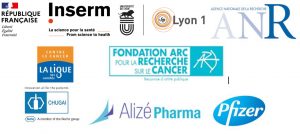Research Team 2 – INSERM UMR 1033
Bone and Joint Pathophysiology: Bioactive lipids and mineral metabolism
We have shown in the past that the natural bioactive lipid, lysophosphatidic acid (LPA), derived from platelets or arising from the lysophospholipase activity D autotaxin (ATX) produced by tumor cells, stimulates the growth of breast cancer bone metastasis. Targeting of type 1 receptor of LPA (LPA1) is a therapeutic target for patients with bone metastases. Our recent study of Lpar1-KO mice showed that LPA controls differentiation and osteoclast resorption activity via the LPA1. In addition, we have demonstrated that ATX is a new platelet mediator stimulating metastasis dissemination of tumor cells and that tumor LPA1 exerts a key role in metastasis of breast cells in triple negative cancers through activation of a PI3K/Zeb1/miR-21-dependent pathway. The research project is largely based on comprehensive analyses of global and bone tissue-specific knockout mice to develop a new field of study on the role of lysophospholipids in bone pathophysiology. The project is organized into two themes. In Theme 1 « Role of ATX / LPA in bone physiology » we will study the role of ATX on osteoclastic and osteoblastic functions and cross talks between TGF and LPA-induced signaling pathways in the control of bone resorption. In the Theme 2 « Role of ATX / LPA in bone pathology » we will exploit relevant animal models for the study of ATX and LPA in osteoporosis, rheumatoid arthritis and bone metastasis.
Our project is built on fundings obtained from INSERM, the University of Lyon-1, highly selective national research programs [The French Ministry of Research (MESR), the French National Agency for Research (ANR) LYSBONE], charity associations (Ligue contre le Cancer, Fondation ARC) and on non-academic collaborations (ALIZE-Pharma, Chugai-Pharma, PFIZER).

UFR de Médecine Lyon-Est
6ème étage
rue Guillaume Paradin,
69372 Lyon cedex08
France
Phone : +33 (0)4 78 77 86 72